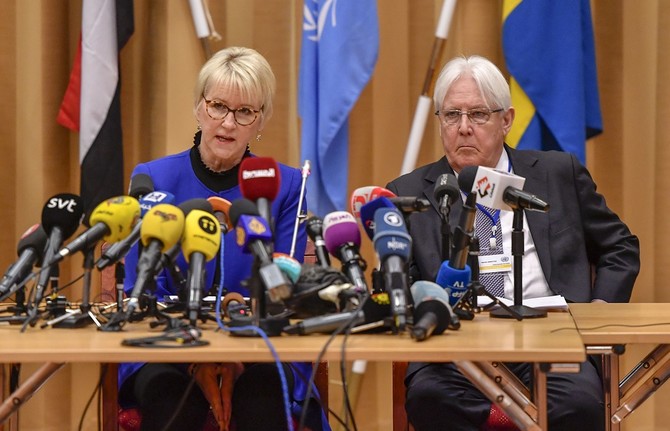RIMBO: Yemen’s warring parties have agreed to a prisoner swap that will allow thousands of families to be reunited, United Nations special envoy Martin Griffiths said in Sweden on Thursday.
Peace talks between Yemeni government representatives and a Houthi delegation began on Thursday, the UN envoy delivered his statement at a press conference.
The reduction of violence, Sanaa Airport, humanitarian access and economic challenges will be discussed, Griffiths said.
Earlier on Thursday, a top Houthi militia official threatened to bar UN planes from using the Yemeni capital's airport, less than two hours before UN-brokered peace talks were due to open in Sweden
"If the Yemeni capital's airport is not opened to the Yemeni people in the peace talks in Sweden, I call on the (Houthi) political council and government to close the airport for all planes," Mohammed Ali al-Houthi tweeted.
Meanwhile, the Yemeni government demanded that the Houthis withdraw from the port city of Hodeidah.
Yemen's foreign ministry demanded the "coupist militias withdraw fully from the western coast and hand the area over to the legitimate government" via Twitter - a reference to Houthi-held Hodeidah.
A 12-member government delegation, led by Yemeni Foreign Minister Khaled Al-Yamani, arrived in Stockholm Wednesday evening, one day after a Houthi delegation flew in from Sanaa — accompanied by the UN envoy.
The talks mark the first meeting between Yemen’s legitimate government and Houthi militants, backed by Iran, since 2016, when 106 days of negotiations yielded no breakthrough in a war that has pushed 14 million people to the brink of famine.
The Sweden meeting follows two major confidence-boosting gestures between the warring parties — a prisoner swap deal and the evacuation of 50 wounded insurgents from the Houthi-held capital for treatment in neutral Oman.
The government delegation was carrying the “hopes of the Yemeni people to achieve sustainable peace,” said Abdullah Al-Alimi, the head of exiled President Abed Rabbo Mansour Hadi’s office.
The delegation had delayed its departure until the Houthis had arrived in Stockholm after they failed to show up for the last UN bid to convene peace talks in September, sources close to the government told AFP.
The Houthis flew into Stockholm on a Kuwaiti plane from Sanaa on Tuesday, accompanied by UN envoy Martin Griffiths, who had promised to travel with them to allay their concerns. 
On Wednesday, a half-dozen members of the Houthi delegation could be seen on the grounds of the venue for the talks, the Johannesbergs Castle — a large estate with a golf course in the countryside 20 km northeast of Stockholm’s Arlanda Airport.
Bundled up against the wintry cold, Houthi delegates could be seen chatting and walking on the grounds, which were cordoned off by police.
The arrival of the Houthis followed two major confidence-boosting gestures — a prisoner swap deal and the evacuation of 50 wounded insurgents from the Houthi-held capital for treatment in neutral Oman.
The US State Department hailed the peace talks in Sweden as a “necessary and vital first step” and called on all parties to “cease any ongoing hostilities.”
The United Arab Emirates, another key backer of the Yemeni government, said the planned talks offered a “critical opportunity” to bring peace to the country.
No date has been announced for the start of the negotiations, but Yemeni government sources said they could begin on Thursday.
The head of the 12-member Houthi delegation, Mohammed Abdelsalam, said it would “spare no effort to make a success of the talks to restore peace and end the aggression.”
At the same time, he called on Houthi insurgents to remain “vigilant against any attempt at a military escalation on the ground.”
The announcement of a deal on Tuesday to swap hundreds of detainees was hailed by the International Committee of the Red Cross as “one step in the right direction toward the building of mutual trust.”
The ICRC will oversee the exchange after the first round of talks in Sweden.
The agreement, struck by the UN envoy in weeks of shuttle diplomacy, came after the wounded Houthis were flown out for treatment on Monday, meeting a key Houthi precondition for joining the talks.
Yemeni government official Hadi Haig said between 1,500 and 2,000 pro-government personnel and between 1,000 and 1,500 Houthis would be released.
On the government side, they include former Defense Minister Mahmoud Al-Subaihi, who has been held by the Houthis since they overran the capital in late 2014, and President Hadi’s brother Nasser, a general and former senior intelligence official.
The Norwegian Refugee Council on Wednesday called for the two sides to put a halt to the fighting.
“Yemen needs an immediate cease-fire and concrete steps to restore public services,” it said in a statement.
“Parties to the conflict must agree ways to reopen all ports and stabilize the nation’s collapsing economy while facilitating full and unfettered access for people in need of humanitarian aid.”
Nearly 10,000 people have been killed in the conflict, according to the World Health Organization, triggering what the UN calls the world’s worst humanitarian crisis.
Rights groups estimate the toll could be up to five times as high.
(With AFP)




























